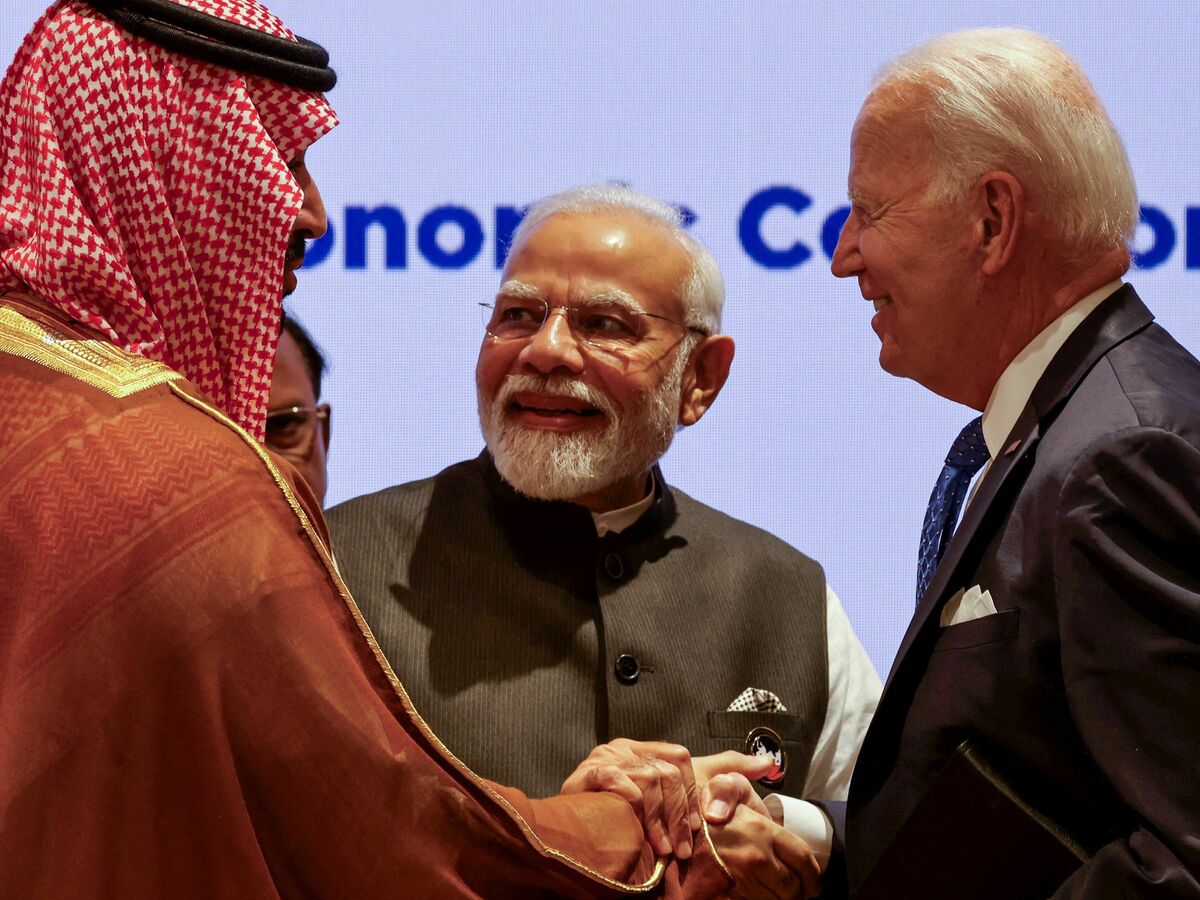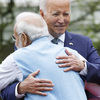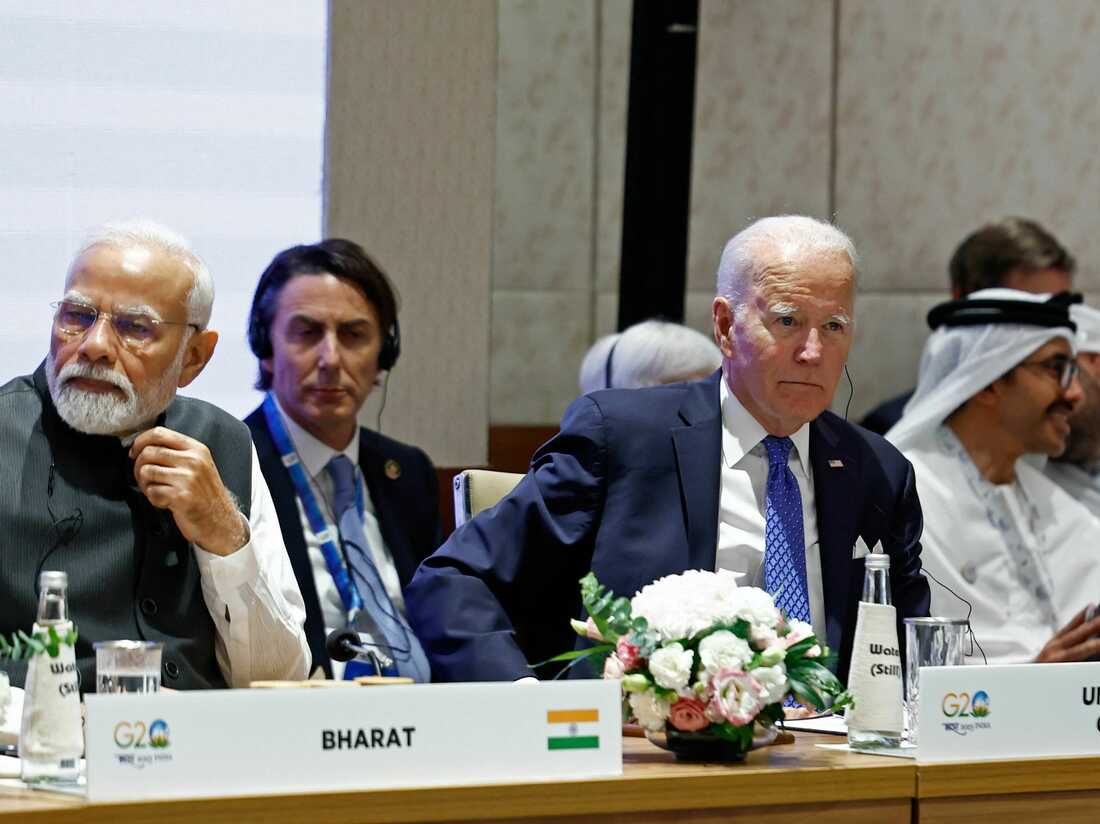
President Biden shook hands with Saudi Arabia’s Crown Prince Mohammed bin Salman and Indian Prime Minister Narendra Modi after announcing a new route linking India to the Middle East and Europe.
Ludovic Marin/POOL/AFP via Getty Images
Hide title
Change the title
Ludovic Marin/POOL/AFP via Getty Images

President Biden shook hands with Saudi Arabia’s Crown Prince Mohammed bin Salman and Indian Prime Minister Narendra Modi after announcing a new route linking India to the Middle East and Europe.
Ludovic Marin/POOL/AFP via Getty Images
NEW DELHI – President Biden announced plans for a new rail and shipping route linking India, the Middle East and Europe – a long-term push to improve the way goods, energy and information move across borders that do not include China.
Biden did Notice Along with other world leaders at the G20 — a summit China’s President Xi Jinping chose to skip this year. Later, Biden shook hands with Indian Prime Minister Narendra Modi and Saudi Crown Prince Mohammed bin Salman.

It’s one of several ways Biden is trying to counter China’s encroachment around the world through its Belt and Road Initiative and other development funding. In the G20, the US and Europe too declared New investments in the railway line linking Angola with the Democratic Republic of Congo and Zambia.
“This is a game-changing regional investment. These are both huge, huge steps forward, but they are far from the only one. We continue to make huge investments in infrastructure around the world,” Biden said.

At the G20 summit in New Delhi, Indian Prime Minister Narendra Modi showed a mural of the Konark Sun Temple Chakra to President Biden.
Ludovic Marin/POOL/AFP via Getty Images
Hide title
Change the title
Ludovic Marin/POOL/AFP via Getty Images

At the G20 summit in New Delhi, Indian Prime Minister Narendra Modi showed a mural of the Konark Sun Temple Chakra to President Biden.
Ludovic Marin/POOL/AFP via Getty Images
Xi skipped the summit. It created an opening
The summit is a top priority for Modi, a leader who Biden has sought to position as a counterbalance to China in the Indo-Pacific region.
Images from Modi’s state visit to Washington in June adorned a large video billboard near the airport where Air Force One landed, and G20 posters featuring Modi were plastered around the capital. Modi declared a three-day public holiday for the G20, and the streets around the summit were empty, the public far from the events.
The leaders of China, the world’s second-largest economy, and Russia, India’s long-time partner, did not want to attend.
“For our Indian partners, there’s considerable disappointment that they’re not here — and thankful that we are,” said Kurt Campbell, Biden’s top National Security Council adviser on the Indo-Pacific region.


Journalists are tightly barred from events, noting India’s track record on press freedom, posing a challenge for Biden to develop closer relationships with leaders who do not fully embrace human rights.
Campbell said it’s something Biden chooses to raise behind closed doors.
“My experience is that the president is direct, open and doesn’t shy away from difficult challenges. But what makes it effective is that he starts from a base of trust and confidence, and I believe that allows his interlocutors to listen more effectively to sometimes challenging issues,” Campbell told reporters.

President Biden will attend the G20 summit in New Delhi. Indian Prime Minister Narendra Modi used a pre-colonial Hindi name on his nameplate during the summit.
Evelyn Hagstein/POOL/AFP via Getty Images
Hide title
Change the title
Evelyn Hagstein/POOL/AFP via Getty Images

President Biden will attend the G20 summit in New Delhi. Indian Prime Minister Narendra Modi used a pre-colonial Hindi name on his nameplate during the summit.
Evelyn Hagstein/POOL/AFP via Getty Images
Biden also worked to develop the World Bank
Biden has also used the G20 to work with other members of the World Bank to make it a more attractive option for Chinese financing, which his national security adviser, Jack Sullivan, described as “coercive” and “unsustainable”. Non-repayment of loans in Asian and African countries.
Biden has asked Congress for more than $2 billion for the World Bank, an investment the White House says will take on more than $25 billion in loans.

He has also championed a G7 initiative with similar objectives to the Partnership for Global Infrastructure and Investment, or PGII.
The White House says the goal is not to force developing countries to choose between China and the West, but to offer them more attractive options.
“We think so [it] Infrastructure with these huge gaps has real appeal to countries in underserved areas,” John Feiner, Biden’s deputy national security adviser, told reporters.
